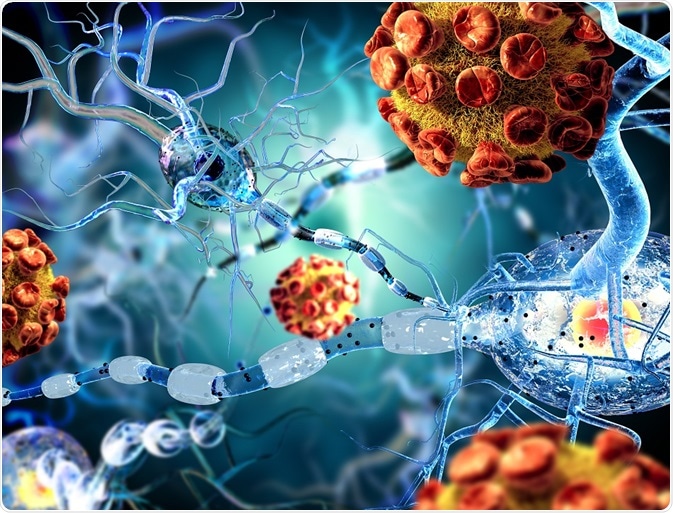Autoimmune encephalitis (AIE) is a blanket term for a group of diseases that involve inflammation of the brain caused by autoantibodies that target antigens on the synapses and cell surfaces of neurons.
 Image Credit: Ralwel / Shutterstock.com
Image Credit: Ralwel / Shutterstock.com
The main areas against which these antibodies are directed include:
- N-methyl-D-aspartate receptor (NMDAR)
- α-amino-3-hydroxy-5-methyl-4-isoxazolepropion acid receptor (AMPAR)
- Leucine-rich glioma inactivated 1 (Lgi1)
- Contactin-associated protein-like 2 (Caspr2)
- Glutamate decarboxylase (GAD)
- Gamma-aminobutyric acid type B receptor (GABABR)
Clinical features
Clinical features of AIE are diverse and include psychiatric, autonomic, and physical. In most cases, there is a subacute or prodromal phase, followed by a gradual and often fluctuating lapse into unconsciousness. Cognitive symptoms such as memory impairments are common and appear early.
It is estimated that up to 87% of AIE patients present with seizures, which occur in different forms, such as:
- Complex partial status epilepticus (45%)
- Epilepsia partia continua (25%)
- Isolated partial seizures, generalized or complex partial (38%)
- Status epilepticus with generalized tonic-clonic seizures (13%)
More than 50% of AIE patients also had fever and symptoms resembling those of the flu for an extended amount of time preceding the actual illness. A similar percentage showed other evidence of brain involvement, such as behavioral aberrations, extrapyramidal signs, altered sensorium, abnormal movements, and language disorders.
Behavioral aberrations, for example, affect about 28% of AIE patients and can include psychiatric manifestations such as uninhibition or aggressive behavior, panic attacks or compulsions, mood elevation, and psychosis. Comparatively, extrapyramidal signs, which affect around 33% of patients, can often include choreoathetoid dystonia, especially of the face and limbs.
Whereas altered sensorium affects about 15% of patients, abnormal movements can arise in about 10% AIE patients. More specifically, abnormal movements resembling pathological startle responses, cerebellitis-associated ataxia, nystagmus, and fluctuations of voice, as well as neuromuscular signs such as muscle spasms or fasciculations
Epidemiology
In northern regions, encephalitis is somewhat rare at an incidence of about 2-3 for every 100,000 per year. Of these, approximately 20% are due to autoimmune mechanisms, including mostly anti-NMDAR and VGKC-complex antibody-positive encephalitis.
AIE affects both men and women equally and in all age groups. In 94% of patients with anti-NMDAR encephalitis, an ovarian teratoma was detected, but this also depends upon race, sex, and age. However, AIE caused by cell-surface antibodies is less likely to be due to underlying tumors than those due to onconeural antigens.
Diagnosis and treatment
Patients are usually negative for viral encephalitis at presentation. Imaging and electroencephalogram (EEG) tests are therefore usually ordered. Diagnosis is often achieved by demonstration of the specific polyclonal immunoglobulin G against the subunit concerned.
All patients should be screened for a tumor once AIE is detected. This includes initial imaging and repeated regular screening.
Most patients with AIE are treated with various forms of immunotherapy. Corticosteroids, either oral or intravenous, account for 90% of AIE treatments, whereas intravenous immunoglobulin (IVIG) therapy is used in about 39% of patients. Additionally, about 10% of patients will be treated with plasmapheresis.
In addition, anti-seizure drugs are usually administered.
Prognosis
In most cases, the outcome of AIE depends upon how soon the diagnosis is made, and further management. In many cases, the primary diagnosis is psychiatric, which can delay the recognition of the true nature and etiology of the disease.
Thus, a high level of awareness is needed to ensure that these conditions are known better and included in the list of differential diagnoses to be ruled out before treating a psychiatric symptom as non-organic in origin.
Improvement is the norm if treated appropriately, but mortality may occur in about 7% of cases, mostly in the acute phase, due to autonomic dysfunction and complications of medical management. Some patients experienced spontaneous resolution of the condition following symptomatic treatment, though this was relatively rare, in about 5% of cases.
The prognosis of AIE is often better if symptoms are less severe, and the patients do not require intensive care. Immediate immunologic treatment and tumor removal, as well as the initiation of second-line immunotherapy if first-line treatment failed, is also associated with an improved prognosis. Relapses can occur in about 12% of AIE cases, of which are repeated in about a third of patients.
References
Further Reading
Last Updated: Apr 23, 2021